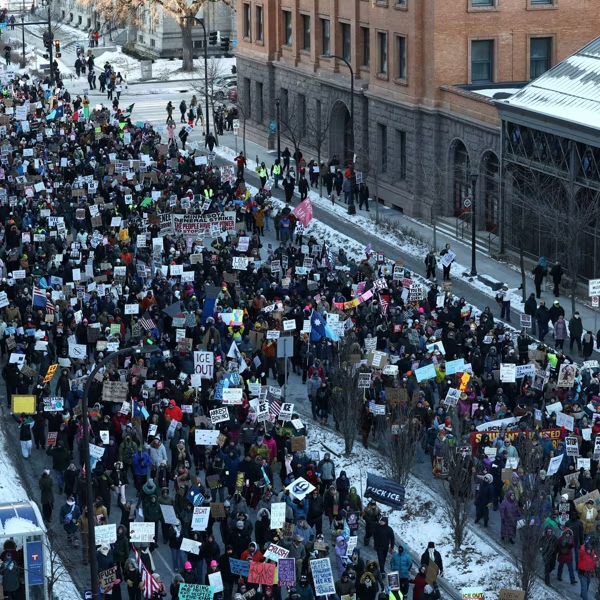The city of Detroit is putting a 15-day moratorium on water shut-offs to thousands of households following escalating public protests against what critics charge is a mass-scale human rights violation.
"There is no question this is the result of all of the pressure that has come to the city of Detroit," Shea Howell of the People's Water Board and Detroiters Resisting Emergency Management told Common Dreams.
Darryl Latimer, deputy director for the Detroit Water and Sewerage Department, announced the temporary suspension of disconnections to Detroit's bankruptcy judge, Steven Rhodes, in federal court on Monday, according to numerous media reports. He said that the pause in disconnections--ostensibly aimed at identifying and providing assistance to hardship cases--will not affect the city's push to collect payments from people who have fallen behind on their bills.
"Everyone shut-off needs to be turned back on."
--Shea Howell, People's Water Board, Detroiters Resisting Emergency Management
Rhodes has previously condemned the water shut-offs for generating "bad publicity" for the city but has fallen short of ordering a halt.
The announcement coincided with a lawsuit filed Monday with the bankruptcy court charging that the shut-offs violate Detroiters' constitutional rights. "Water service to private residences is the most basic and essential utility service, and is necessary for the health and safety of the residents," the filing reads, according to media reports.
The moratorium follows rising public outrage after DWSD announced last month it is implementing a plan to escalate the number of delinquent households to be shut-off to at least 3,000 a month. Nearly half of all Detroit residents are behind on their water payments, and at least 7,000 people were disconnected in June alone. The pool of people unable to pay is likely to expand as the city continues to cut public services, including welfare and public pensions, while in the midst of foreclosure and unemployment crises.
Many residents of this majority black city suspect that the disconnections are part of a larger plan, backed by emergency manager Kevyn Orr, to privatize the DWSD and, ultimately, displace poor communities of color to make way for gentrification.
Thousands of people from across the state and country marched through Detroit last week to demand an end to the water shut-offs and an immediate restoration of services. The mass rally followed two direct actions, in which local residents blocked the entrance to Homrich Inc.--the company contracted by the city to shut off water to homes--leading to arrests. Residents have organized watering stations, rapid response teams, a Water Rights Hotline, and local canvassing efforts to help each other cope.
"DWSD must take this time to fundamentally reconsider its use of draconian water shutoffs as a means of strong-arming residents who cannot afford to pay their water bills." --Wenonah Hauter, Food & Water Watch
The shut-offs have garnered condemnation from around the world, including UN officials, who slammed the denial of water as a "violation of human rights." Later this week, the Windsor chapter of the Council of Canadians will send a convoy of water to Detroit to show solidarity with residents "[u]nable to cook, bathe, or brush their teeth."
Wenonah Hauter, Executive Director of Food & Water Watch, declared in a Monday press statement that the temporary moratorium "is only a small step toward rectifying the problem in Detroit." Hauter urged, "DWSD must take this time to fundamentally reconsider its use of draconian water shutoffs as a means of strong-arming residents who cannot afford to pay their water bills."
"Looking forward, we call on the DWSD to indefinitely suspend all residential shutoffs, restore service to those families already turned off, and immediately begin work to implement an income-based Water Affordability Plan," declared the Detroit Water Brigade in response to the moratorium.
While Howell commended the temporary reprieve, she expressed concern that the DWSD has expressed no indication that they are willing to turn disconnected households back on or discuss long-term solutions.
"Everyone shut off needs to be turned back on," she said. "We want to make sure the Detroit water system doesn't become privatized and a source of profit."



